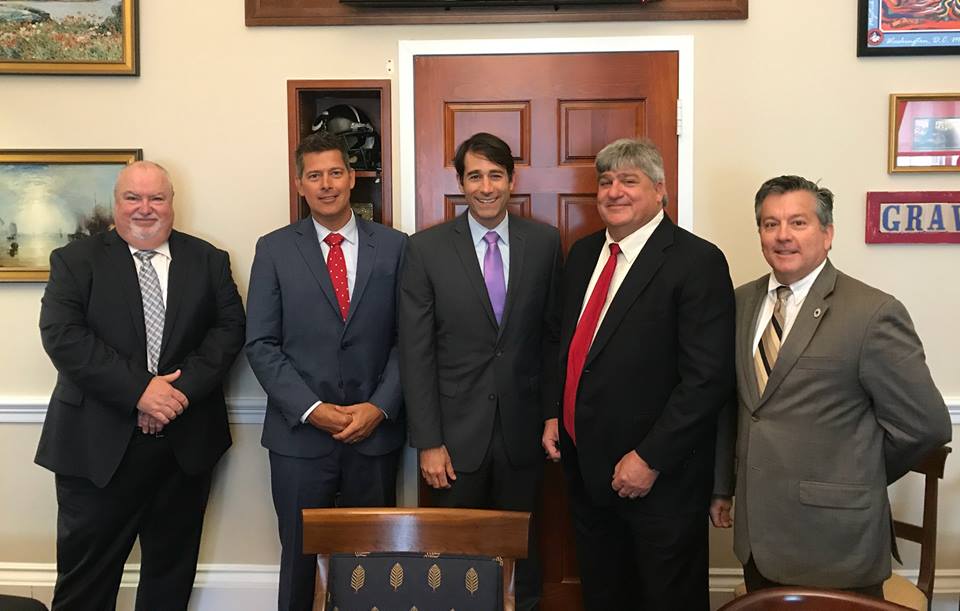
In addition to promoting the Morganza to the Gulf Hurricane Protection Project and other levee projects in Lafourche and Terrebonne Parish, MAC works on Capitol Hill and in Baton Rouge to resolve regulatory issues and promote policies that will help our local communities build effective coastal protection projects quickly and cost-efficiently. These issues include:
Protection of GOMESA Funding
MAC supports the concept of sharing an equitable level of Federal revenues derived from offshore oil and gas activities with adjacent coastal states. We believe that the Gulf of Mexico Energy Security Act of 2006 (GOMESA) was historic legislation aimed to increase equity by sharing offshore revenues and providing the State of Louisiana critical funding for coastal restoration and protection projects. In addition to supporting lifting the current cap within GOMESA, MAC is supportive of all efforts to ensure the State of Louisiana receives an equitable portion of offshore revenue sharing.
408 Process
The routine practice of requiring permit applications undergo a Section 408 process appears to be increasing and too often an unnecessary requirement. Even projects such as highway improvements are being delayed and realizing cost increases as a result of unnecessary Corps interaction. This requirement is already substantial and it appears that the growth trend will continue without reform. One element depicting how burdensome this process has become is the fact a Section 404 permit application is not processed until after the 408 process has been completed. This sequencing adds delay and costs to projects across the country and potentially threaten the viability of communities.
404 Permit Process and Self Performed Mitigation
Government agencies providing protection and restoration projects for the benefit of communities and the environment should not be held to the same mitigation standard as other projects with wetland impacts. A protection project often protects wetlands behind the levee and restoration projects, by definition, are intended to restore more wetlands than the project negatively impacts. In addition, for coastal Louisiana, agencies must recognize that time and tide are working their will while studies are performed and wasteful consideration delays construction critical to protecting communities. Too often, it appears that the wetland impact of a given project is studied for an inordinate amount of time – never factoring in the reality that, if the project does not advance, the very wetlands under evaluation will be overtaken by subsidence and inundation. The realities of a vanishing coast should be a greater factor in Federal mitigation requirements and recognition that the no-action alternative can have the most severe impact upon wetlands.
MAC believes that hurricane protection and restoration projects undertaken in the public interest, by public entities, should have a ratio for mitigation at or below 1:1.
Servitude
Each day that is wasted means more acres of land are washed away; the Corps’ tightening of servitude requirements is creating substantial delays. The Corps has recently begun to require onerous language in mitigation conservation servitudes for self-performed or permittee responsible mitigation of self-performed or permittee responsible projects. Since nearly 80% of coastal Louisiana is privately owned, it has become increasingly difficult or impossible to complete such projects on those private lands. Ironically, in absence of the onerous language requiring perpetual donation, many landowners are willing to donate these servitudes. They are, however, unwilling to perpetually donate such servitudes, as the potential value of the subject land is so high and the mitigation projects themselves have a terminal point in time. If servitude requirements are not brought to a more rational structure, self-performing mitigation will not exist in coastal Louisiana. Mitigation for these projects should take place within areas of deterioration – areas where investment in mitigation banks is infrequent or nonexistent.
In coastal Louisiana, MAC suggests that mitigation servitude should not be longer than the project it mitigates and should be accommodating and encouraging to those projects and landowners existing in the deteriorating coastal landscape.
Increasing a Community’s Protection
It has recently come to our attention that Corps policy does not allow a Federal project to build above the authorized elevation. There are hurricane protection systems that have been authorized decades ago, before post Hurricane Katrina standards that are in excess of what is currently considered a 100-year level of protection. One such levee district reports that the Corps is resisting its use of non-federal funds to improve flood protection beyond the protection originally authorized by Congress.
MAC suggests that Congress make clear that a project’s Congressional authorization represents a minimum level of protection for which federal funds are allowed. If a local sponsor wants to enhance their community’s level of protection, the authorization should not be the barrier.
